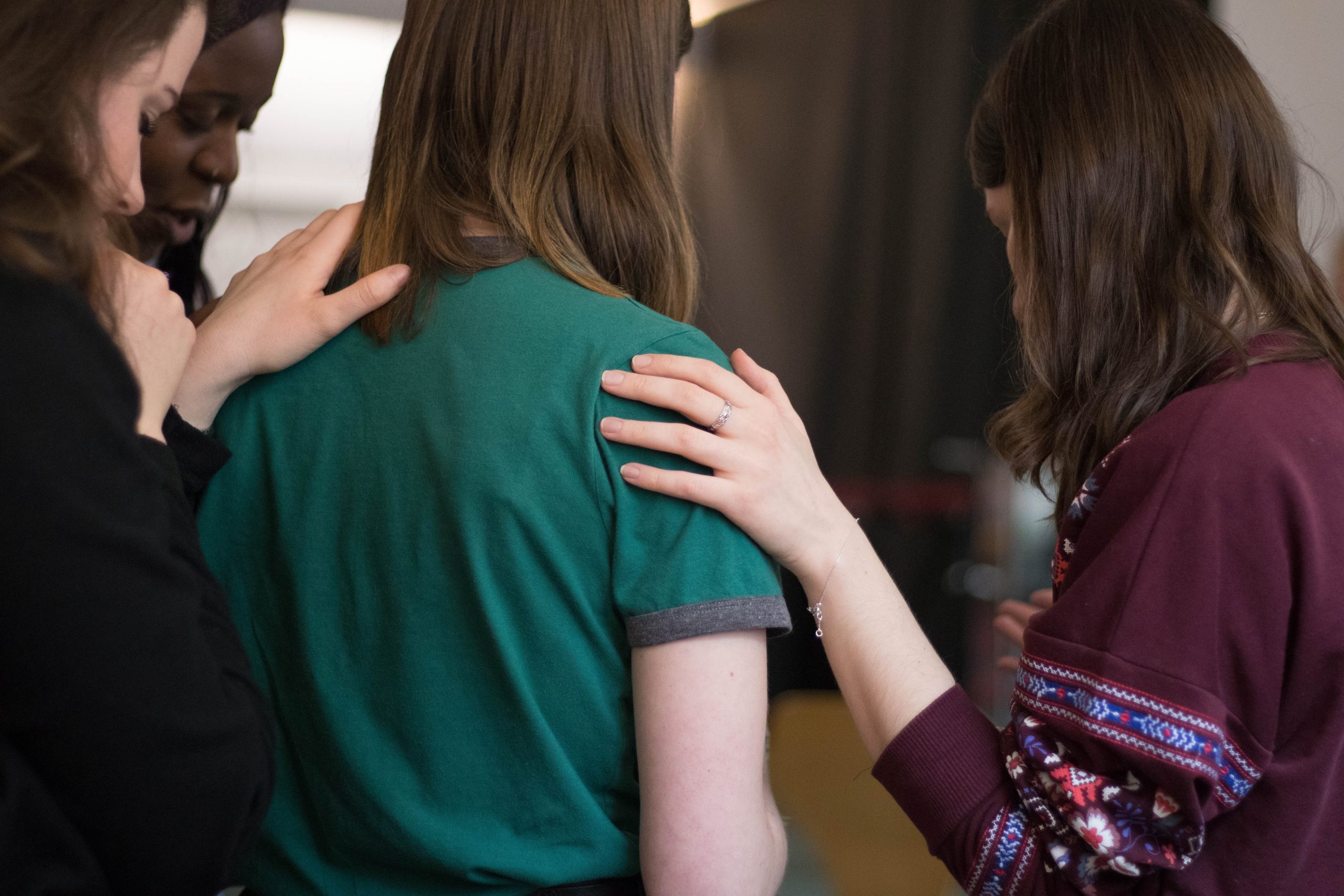As a Christian teenage girl struggling with pornography, I heard a lot of messages about getting help and breaking free from sin. Many of them were unhelpful. In the years since, I have heard several more, either in church or at Christian conferences, or even from magazine editors and other authors.
For the next post in the Porn in Church series, I want to address some of them, explain why they aren’t helpful and how we can change them.
Let me preface this by saying, this is not an attack on pastors. If you or someone you know has said one of these things, I’m not coming for you with a pitchfork. Pastors have a hard job and not a ton of training, in my opinion, when it comes to things like sexual trauma and sexual struggles.
Hopefully, as this issue becomes more prevalent, we’ll move away from the only message about sex being “save it for marriage” and into a more holistic Gospel-centered approach to sex, sexual sin, sexual trauma, healing, and freedom.
My hope in sharing these things is to help move conversations in that direction. That starts by acknowledging that some of the talking points we cling to do more harm than good.
If you aren’t willing to tell someone, you don’t really want help.
The first time I heard this was at youth camp on bonfire night. I was addicted to pornography and really did want help. I was just afraid. Who do I tell? Who is going to help me? As a victim of sexual abuse, I didn’t want one of the male pastors to help me. We didn’t have any female leadership who could help. I was scared. It wasn’t pride or fear of man that kept me silent, it was the crippling fear of “what if I tell someone and they can’t help me? What if they are lying?”
Why isn’t this helpful?
This statement, while meant to be motivational and a bit of a gut-check, does not take into consideration those very real fears. Can the people I am telling be trusted? How are they going to respond? What does help look like?
When you’re injured in a car accident, you know where to go. You go to the hospital. A hospital filled with doctors and nurses and machines and testing capabilities. You assume that these trained individuals will do what they can to help you. But that’s not the situation or the approach when it comes to confession in the church. I grew up in a church that didn’t talk about people’s pasts or people’s struggles. It was “flaunting the sin.” And yet, I was somehow supposed to believe that these perfect people could and wanted to help me.
How to help.
Instead of judging someone’s true motives (“you don’t really want help”), we need to, as a church begin to act like a place where broken people come to find hope and healing. When churches, instead, present themselves more like trophy cases for the holy and righteous, those who struggle can feel a little lost, judged, and already condemned. Their case is hopeless before it is even presented.
That doesn’t mean you need to find a heroin addict to be your next associate youth pastor, but what it does mean is that we need to encourage people to be honest about their stories. Instead of protecting the image of the church, we need to allow the redeemed in our midst to reflect the image of Jesus. This helps the people who truly do need help feel more comfortable with the idea of coming forward to ask for it.
Remember, our churches are made up of people– people who have the same issues and struggles as those outside of the church walls. There are people in your church who struggle with drug addiction, sexual addiction, and sexual identity. You have people in your church who are victims of abuse and racial violence. There are teens in your youth group who are having sex, sending sexts, or who have had an abortion. And if you are thinking to yourself, “No way! Not my church” you, dear shepherd, have had the proverbial wool pulled over your eyes.
Be honest about the needs that are in your flock. If you don’t know what they are, now is the perfect time to find out and to speak to those needs in a way that draws people toward Jesus and grace.
If you are really a Christian/If you really love Jesus, then you’ll just stop.
This seems like a simple if/then statement. Jesus fixes everything and if we really loved Him then we would stop. It is sometimes accompanied by the image of our sin breaking God’s heart or being like “nailing Jesus to the cross again.”
Why isn’t this helpful?
For starters, this isn’t true. Jesus does say, “If you love me, then keep my commandments (John 14:15)” but we literally have an entire Old Testament narrative that shows it’s impossible to follow all of God’s commands. In the sermon on the Mount, in Matthew 5, Jesus shows us very clearly that even if we obey the commandments with our actions, we can violate them in our hearts. In other words, we can’t will ourselves into being perfect. There is no one who loves Jesus perfectly.
You, pastor, do not love Jesus perfectly. You don’t love Him “enough.”
Beyond that, this heaps shame upon shame for those who struggle with habitual sin. It tells them that since they are still struggling they either a) are not Christians or b) are not trying hard enough. This makes them feel like they have to handle this on their own, through sheer will. It ignores the science of the brain and its response to trauma or to addictive stimuli. It ignores the true need for healing and communicates the message, “God wants you to get your act together.”
How to help.
The message of the Gospel is not “Just stop it.” Acknowledge that the Christian life hangs on the idea of imperfect people who can never be perfect, needing a perfect Savior. That’s the Gospel. That is grace. We cannot save ourselves. Yes, Christians can struggle with sin. People who love Jesus can struggle to break free from sinful behaviors whether that be pride, sex, porn, anger, drug addiction, and so on. Do we have the power of the Holy Spirit in us? The same power that raised Jesus from the dead? Yes. And that matters because that means it’s not our power, or our love, or our will that brings healing and freedom– it’s God. And we need that power because we are weak and incapable of loving God enough to fix ourselves.
There is more that goes into freedom than simply “stop.” When we overemphasize “behavior modification” at the expense of heart transformation, we aren’t doing Kingdom work. God is often our hearts. He wants relationship. He wants healing, and our messages in our churches, need to communicate that. We need to recognize that people who love God are struggling to stop sinful behaviors and instead of scolding them for not being “strong enough,” we need to come alongside them in the fight.
Men watch porn because God made them that way.
This one usually pops up in a sermon about modesty or lust. While making the point that women need to be modest, the reasoning is because God has hardwired men to lust. This is a spin-off of the narrative that “men are visually-wired and that’s why they struggle with porn.”
Why isn’t this helpful?
First, let’s be really clear about something. God did not make us– male or female- to watch porn or to lust.
Second, it’s very important that we realize that men being “visually wired” doesn’t mean women are not visually wired. This line makes women who are visually stimulated feel like freaks of nature. It’s not wrong for a women to be aroused by visual content. It’s not “unwomanly.” I hear from plenty of women who are visually “triggered” by men. I was one of them. Men do not have the corner market on being turned on by what they see.
Read: “Boys will be boys” is killing our men.
Both men and women can be aroused by visual stimuli. That gives neither a free pass for lust.
Did God make us this way? Absolutely. Did He design us this way so that we can look at pornography? Absolutely not. Sin is all about taking what God says is good and turning it into something bad, corrupting it and then finding some way to blame someone else for it.
How to help.
Just throw this whole line of reasoning in the garbage bin, honestly. There are not gender-specific sins. Men can lust and women can lust. Men can watch porn and women can watch porn. Men can enjoy watching porn and women can enjoy watching porn. Men don’t have their own exclusive problems while women have other exclusive problems. What we have are human problems.
Instead of making visual stimulation a gender-specific excuse for sin, we need to reframe this. People can be aroused by visual stimuli and one of the ways sin takes advantage of this is through pornography. Men have no excuse and women have no excuse. Men may be more likely to be sexually aroused by what they see but that does not give them excuse to lust, nor does it mean women are not sexually aroused by what they see.
Women desire love; men desire sex.
I feel this is perhaps the most prolific, tired line when it comes to pornography, sex, and romance. We have it in our heads that men are visually wired (see prior statement) and, in contrast, women are romantically wired. Men want sexual release; women want warm fuzzies. Men struggle with the eyes; women struggle with the heart. This is also a driving thought behind much of our teaching on modesty, relationships, and even dating.
Why isn’t this helpful?
Can we please just stop this one? There is no his and hers when it comes to desires and to generalize is absolutely unfair and very unhelpful. (Also, why is sex completely separate from love in this context, church?)
Women can and do desire sex. They have sex drives. They have sexual dreams and even “wet” dreams. They can experience arousal for no good reason. They masturbate. Women struggle with lust.
When we normalize this for men and then act like women have no idea, we’re wrong. We alienate women who desire sex and make it seem like there is something wrong with them for doing so. We muddy the waters for a woman who struggles with pornography and make her feel freakish for wanting sexual release.
Read: My Problem Wasn’t Amish Romance Novels
How to help.
Desires are personal. They are unique to us as people, shaped by our personalities, our hormones, our families, our histories, our stories. All men don’t think about sex “every six seconds.” All women don’t desire only love and romance. Some women actually think about, enjoy, and want sex. Some men actually desire snuggles and a walk on the beach. There is nothing wrong with those women and there is nothing wrong with those men. These aren’t gender-specific desires and we need to stop preaching them like they’re the Gospel truth.
Perhaps you’re thinking: “But what about the ‘research’ from (insert author name)?” This is perhaps one of the only times I will recommend picking up a copy of The Great Sex Rescue. The entire book is devoted to tearing down some of the more commonly taught misconceptions when it comes to men vs. women. If you find yourself often saying, “Men are this way but women are the other” I encourage you to read it, with the advice to read my review first.
Why would a woman watch porn?
This one I hear all the time. At conferences. At churches. I still remember a pastor coming up to me after a presentation, his face twisted in disgust. “I just don’t get it,” he said. “I understand why men watch porn, but why would a woman do that? It just doesn’t make any sense.”
When I first started writing, I reached out to a magazine and asked for an opportunity to address their female readers who may struggle with pornography. “You have several articles addressing men, but I noticed you don’t have any that mention women and I would like to change that.”
From the editor’s response, one line is forever seared in my mind, “I’ve never heard of a woman spending hours online looking at pornography.”
To both of those men, I wanted to say, “You do realize I am one of those women, right?”
Read: Christian Women Watch Porn?
Why isn’t this helpful?
I feel like it should be obvious that this response just isn’t going to help a woman who struggles with pornography. It’s a complete invalidation of her struggle. It’s a disbelief. Imagine being a woman who struggles and hearing that come from leadership. It will immediately cause you to question, “What is wrong with me?” You don’t have an answer, because you actually don’t know why you’re doing it.
There’s also the underlying barb that it “makes sense” for men, but that there is something intrinsically wrong with a woman who struggles.
An additional side of this is when we assume certain reasons why.
- Well, she comes from a fatherless home so obviously that’s why.
- She was probably raped or sexually abused and just doesn’t remember it.
This may be hard to grasp, but there doesn’t have to be a reason. Do we psychoanalyze why men struggle with porn? No. Yet we are so quick to bristle when it’s a woman who is struggling.
Oh, she must not mean real porn. She means the soft core stuff, like 50 Shades of Gray or Magic Mike.
She must be talking about romance novels.
Women can’t really be addicted to hardcore pornography. Maybe she watches some TikTok videos on her phone. Maybe that’s what she means.
How to help.
Allow me:
Christian women
yes, women
yes, Christians
yes, in your church
struggle with pornography, lust, masturbation, and fantasy. They are spending hours searching for content online. Content that would make your skin crawl. They are watching violent pornography, homosexual pornography, bestiality, illegal pornography. They are masturbating. They are lusting after men in your congregation. They may even be fantasizing about you. They are sending photos and videos to others.
And now you know.
Stop asking why. Men and women who struggle with sexual sins don’t always know why. Why does one person struggle with alcohol while another struggles with sex? Sometimes there isn’t an obvious reason. The struggles are still indicative of an underlying issue that has to be healed and addressed.
Instead of getting sidetracked and trying to gaslight a woman’s struggle, make it clear that porn isn’t ok for either gender. State that both men and women struggle with it, even if you don’t personally understand why and both men and women need to seek help and healing.
Honestly, whether or not you personally have ever heard of a woman with this struggle doesn’t matter. In fact, if you sign up for updates for this blog, you will get the first four chapters of my book, Beggar’s Daughter. You’ll be able to read my story and then when a woman comes to you, you won’t be able to say hurtful things like, “I’ve never heard of that.”
You can also find out more in my book, Quenched.






